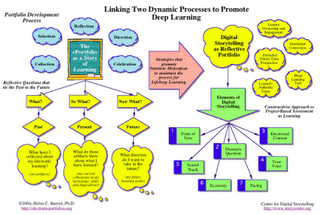Facilitating Deep Learning in Adults

Today the lecturer suggested that computer technologies generally encourage surface learning reather than deep learning experiences. He has asked us to research the concept of deep learning as it appears on the internet and link the concept to computer technologies. The underlying question is: How can we facilitate deep learning in adults and using information technologies?
Researching the matter on the Internet, I found the adjacent concept map.
Another site that examines the conditions for promoting deep learning can be found here: http://www.ntlf.com/html/pi/9610/disc_learn.htm
On this site, Professor Al McLeod writes:
"Based on the systematic feedback of approximately 9,000 students during my career as a college professor, I've noted some of the core factors that promote deep learning. Other factors could be cited, but these seem basic. Perhaps the central idea above is that any factor that promotes the fight/flight reaction—and related feelings of stress, unfair and unfriendly competition, or anxiety—inhibits positive DLS through the production of stress hormones as mediated in the hypothalamic-pituitary axis. Conversely, any social action that promotes safety, security, caring and similar affective states, facilitates positive DLS through the release of positive hormones."
It appears that classroom situations that promote feeling of safety amongst and for the students, work best in facilitating possibilities for deep learning.

0 Comments:
Post a Comment
<< Home